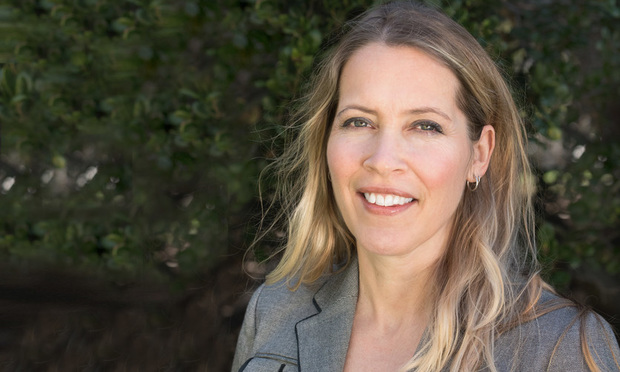General Mills Takes Lead to Reduce Pesticides in Supply Chain, Avoids Proxy Fight
General Mills recently released its Global Responsibility Report 2019 and published new information, which outlines specific strategies for reducing pesticide use.
August 19, 2019 at 05:13 PM
4 minute read
 Danielle Fugere, president and chief counsel with As You Sow. Courtesy photo.
Danielle Fugere, president and chief counsel with As You Sow. Courtesy photo.
By stepping up to lead efforts on sustainable agriculture, General Mills Inc. has dodged a proxy fight with shareholder activist group As You Sow over the use of pesticides in the company’s supply chain.
Minnesota-based General Mills recently released its Global Responsibility Report 2019 and published new information, which outlines specific strategies for reducing pesticide use.
“By this action, General Mills is stepping up as a leader among its peers,” said a statement from As You Sow.
In March As You Sow and shareholders had placed a resolution on the company’s agenda for the Sept. 24 annual meeting. The resolution specifically names the company’s popular Cheerios brand cereal as being implicated in lawsuits over pesticide residue.
A similar resolution last year won 31% support. They withdrew this year’s resolution Aug. 15 after the company made public the new information dealing with pesticides.
General Mills referred questions to the report and its other published statements. It said general counsel Richard Allendorf was not available for comment.
The company’s published information lists four key strategies to reduce pesticide use: a detailed commitment to regenerative agriculture, continued work on integrated pest management, expansion of organic acreage, and protection of pollinators. The strategies “directly reduce farmer reliance on pesticides and other agrochemicals,” the company statement said.
Christy Spees, As You Sow’s environmental health program manager, and president Danielle Fugere have been working with General Mills’ investor relations and in-house counsel on resolving the pesticide issue.
Fugere, an attorney, said in a statement that the food industry has been locked into a system of pesticide use that is inflexible and harmful, damaging the pollinators needed to sustain agriculture. “We are pleased to see General Mills stepping up as a leader in moving toward clean food innovation,” she added.
Spees told Corporate Counsel that the group’s work with General Mills began in 2017 when it seemed the company had no public policy on pesticide use. She called it a “reputational risk” as well as an environmental one.
“Not much progress was seen after last year’s resolution, so we filed another one for 2019,” Spees said. “That brought the company back into conversations” that led to its publishing new commitments.
She said General Mills is the first company in the food industry to commit to regenerative agriculture, “which we see as a really major improvement and hope other food manufacturers will follow. They are also the first to take this explicit stance on pesticides … that they want their producers to use fewer pesticides.”
In General Mills’ 2019 responsibility report, chairman and CEO Jeffrey Harmening states, “We face tremendous change in our industry, with unprecedented social and environmental challenges. Navigating this landscape requires transformation and innovation at every level. We continue taking bold actions to advance sustainability … [and] we embrace our responsibility to help achieve a stable climate, healthy watersheds, strong ecosystems and better lives for farmers.”
Here are some other highlights from the report:
- General Mills is now the second-largest U.S. organic food producer.
- 85% of 10 priority ingredients are sustainably sourced, and the company is working toward 100%.
- It has made a 13% decrease in greenhouse gas emissions across its chain since 2010, with goals of reaching 28% by 2025 and sustainable levels by 2050.
- It has planted 55,000 acres of pollinator habitat.
This content has been archived. It is available through our partners, LexisNexis® and Bloomberg Law.
To view this content, please continue to their sites.
Not a Lexis Subscriber?
Subscribe Now
Not a Bloomberg Law Subscriber?
Subscribe Now
NOT FOR REPRINT
© 2025 ALM Global, LLC, All Rights Reserved. Request academic re-use from www.copyright.com. All other uses, submit a request to [email protected]. For more information visit Asset & Logo Licensing.
You Might Like
View All

'Climate-Smart Beef'?: DC Lawsuit Accuses Tyson Foods of False Advertising
3 minute read

SEC's Proposed Climate Disclosure Rule Draws Concern From Left-Leaning Senators
4 minute readTrending Stories
- 1'A Death Sentence for TikTok'?: Litigators and Experts Weigh Impact of Potential Ban on Creators and Data Privacy
- 2Bribery Case Against Former Lt. Gov. Brian Benjamin Is Dropped
- 3‘Extremely Disturbing’: AI Firms Face Class Action by ‘Taskers’ Exposed to Traumatic Content
- 4State Appeals Court Revives BraunHagey Lawsuit Alleging $4.2M Unlawful Wire to China
- 5Invoking Trump, AG Bonta Reminds Lawyers of Duties to Noncitizens in Plea Dealing
Who Got The Work
J. Brugh Lower of Gibbons has entered an appearance for industrial equipment supplier Devco Corporation in a pending trademark infringement lawsuit. The suit, accusing the defendant of selling knock-off Graco products, was filed Dec. 18 in New Jersey District Court by Rivkin Radler on behalf of Graco Inc. and Graco Minnesota. The case, assigned to U.S. District Judge Zahid N. Quraishi, is 3:24-cv-11294, Graco Inc. et al v. Devco Corporation.
Who Got The Work
Rebecca Maller-Stein and Kent A. Yalowitz of Arnold & Porter Kaye Scholer have entered their appearances for Hanaco Venture Capital and its executives, Lior Prosor and David Frankel, in a pending securities lawsuit. The action, filed on Dec. 24 in New York Southern District Court by Zell, Aron & Co. on behalf of Goldeneye Advisors, accuses the defendants of negligently and fraudulently managing the plaintiff's $1 million investment. The case, assigned to U.S. District Judge Vernon S. Broderick, is 1:24-cv-09918, Goldeneye Advisors, LLC v. Hanaco Venture Capital, Ltd. et al.
Who Got The Work
Attorneys from A&O Shearman has stepped in as defense counsel for Toronto-Dominion Bank and other defendants in a pending securities class action. The suit, filed Dec. 11 in New York Southern District Court by Bleichmar Fonti & Auld, accuses the defendants of concealing the bank's 'pervasive' deficiencies in regards to its compliance with the Bank Secrecy Act and the quality of its anti-money laundering controls. The case, assigned to U.S. District Judge Arun Subramanian, is 1:24-cv-09445, Gonzalez v. The Toronto-Dominion Bank et al.
Who Got The Work
Crown Castle International, a Pennsylvania company providing shared communications infrastructure, has turned to Luke D. Wolf of Gordon Rees Scully Mansukhani to fend off a pending breach-of-contract lawsuit. The court action, filed Nov. 25 in Michigan Eastern District Court by Hooper Hathaway PC on behalf of The Town Residences LLC, accuses Crown Castle of failing to transfer approximately $30,000 in utility payments from T-Mobile in breach of a roof-top lease and assignment agreement. The case, assigned to U.S. District Judge Susan K. Declercq, is 2:24-cv-13131, The Town Residences LLC v. T-Mobile US, Inc. et al.
Who Got The Work
Wilfred P. Coronato and Daniel M. Schwartz of McCarter & English have stepped in as defense counsel to Electrolux Home Products Inc. in a pending product liability lawsuit. The court action, filed Nov. 26 in New York Eastern District Court by Poulos Lopiccolo PC and Nagel Rice LLP on behalf of David Stern, alleges that the defendant's refrigerators’ drawers and shelving repeatedly break and fall apart within months after purchase. The case, assigned to U.S. District Judge Joan M. Azrack, is 2:24-cv-08204, Stern v. Electrolux Home Products, Inc.
Featured Firms
Law Offices of Gary Martin Hays & Associates, P.C.
(470) 294-1674
Law Offices of Mark E. Salomone
(857) 444-6468
Smith & Hassler
(713) 739-1250






